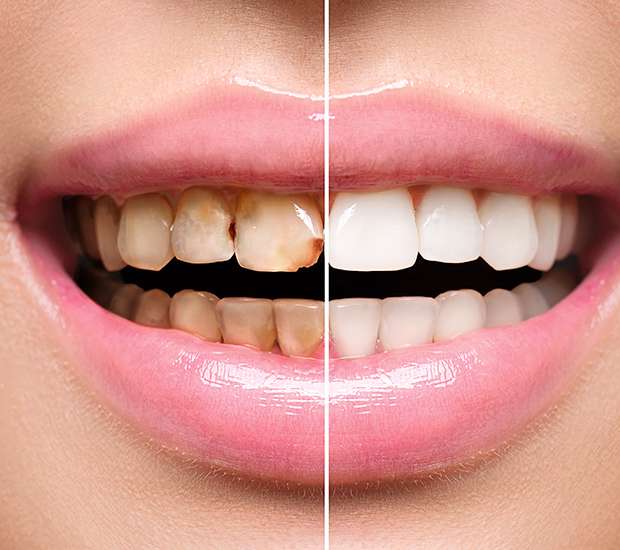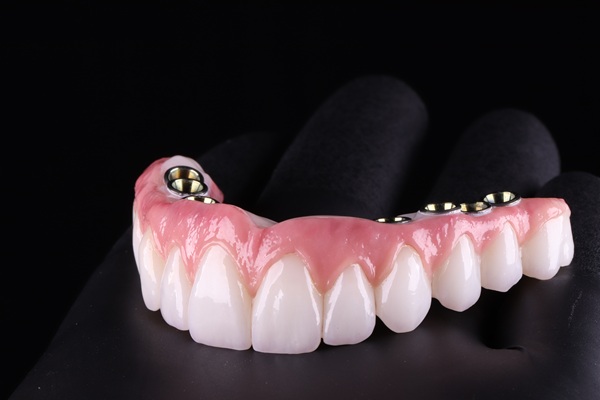Dental Implant Restoration Dumont, NJ
Dental implant restorations are one of the most popular tooth replacement options available for people who have lost one or more teeth. Dentists insert these implant posts surgically into the jawbone, so they replace the root of the lost tooth or teeth. Dental implant restoration is a process of restoring the tooth prosthesis, also known as a crown, by supporting it with dental implants.
Dental implant restoration is available at Dumont Family Dental in Dumont and the surrounding area. This dental restoration is popular and preferred by many because they are natural-looking, long-lasting, and restores full dental function. Find out how you can get dental implants by calling (201) 374-7202 to book an appointment.
The Causes of Implant Failure
While the success of the implant process relies on several factors, certain actions and health conditions can increase the risk of implant failure. For example, bruxism and gum disease may harm a healing implant, while conditions such as osteoporosis may make the bone too weak to support or anchor the implant screw. Furthermore, according to the Journal of Clinical and Experimental Dentistry, radiation therapy (especially to the head and neck) from ongoing cancer treatment can inhibit the bones' healing ability.
Additionally, for dental implants to work, there must be enough bone mass to hold the implants securely. If there is inadequate or insufficient bone mass, the dentist may suggest bone augmentation or bone grafting. The oral cavity, especially the teeth and the supporting tissues, must also be healthy for the implants to hold up.
Depending on the location of the implant, smoking can also cause implant failure. The dentist may recommend quitting smoking totally or until the treatment ends. Certain medications, such as antidepressants, may also influence the rate of bone metabolism and affect the osseointegration process negatively.
“While the success of the implant process relies on several factors, certain actions and health conditions can increase the risk of implant failure.”
Dental Implant Restoration Basics
Though dental implants are generally successful, there are occasional instances where restoration or replacement is necessary. Fortunately, a failed implant is easy to remove, and the procedure is relatively common for dentists to perform. If the dentist decides that the implant needs replacement, they will remove it and carefully clean the area. As a result, there will be no bone loss around the implant site if there is no need for a bone graft procedure.
However, if there is bone loss, the dentist may use a bone graft to make the implant restoration process possible. However, it may take several months for the bone to heal before a new implant can be inserted. The dentist may discuss ways to mitigate the risk factors that led to the initial implant failure during the healing process. These preventive measures may include quitting smoking, using mouthguards, and more.
“Though dental implants are generally successful, there are occasional instances where restoration or replacement is necessary.”
Replacing Dental Implants
Restoring dental implants consists of two treatment stages: the implant placement and the restorative stage. The implant placement stage can be a one- or two-stage process depending on the approach. In any case, the dentist will place the implant inside the jaw and cover the implant post with a cover screw to prevent bone in-growth. They will then cover both the implant and cover-screw with gingival tissue. The bone will need to heal around the implant for about three to six months, depending on the quality and quantity of the bone. Throughout healing, the bone will fuse or bond with the implant in a process known as osseointegration.
Once the oral tissues have healed fully, the restoration process can begin. For single-implant restorations, the dentist can choose between the screw-retained crown or cement-retained crown, depending on the patient's preferences and the implant's position. The screw-retained crown has a screw access hole that fits over the abutment, featuring an anti-rotation feature to lower the chances of screw loosening. The main advantage of this option is retrievability in case of loosening or fracture and the easy examination of the implant and gums. It also allows the dentist to remove the crown without causing damages.
The other option is the cement-retained crown. Using dental cement, the dentist will fix the crown directly to a custom abutment connected to the implant. Patients with aesthetic concerns will benefit from this option because it assures the most cosmetic appeal. However, the restoration cannot be removed without causing damages to the crown. There is also a concern for residual cement, which may become a medium for bacteria colonies.
“Restoring dental implants consists of two treatment stages: the implant placement and the restorative stage.”
Check out what others are saying about our dental services on Yelp: Dental Implant Restoration in Dumont, NJ
After the procedure
There is typically some discomfort following an implant restoration and aftercare instructions to follow. To speed up recovery and avoid irritation of the affected area, stick to a soft diet of healthy foods and do not consume beverages high in sugar. Patients are often required to make routine follow-up visits as well.
You can take steps to make your dental implants last and reduce the need for implant restoration. Dentists advise you not only avoid certain foods but also tobacco products and smoking. For dental implants, patients should use a low-abrasion toothpaste along with a soft-bristled toothbrush. Special flosses and interdental brushes can make it easier to keep your dental implants clean and the area around them healthy.
“You can take steps to make your dental implants last and reduce the need for implant restoration.”
Questions Answered on This Page
Q. What should you do after an implant restoration procedure?
Q. What are some of the causes of dental implant failure?
Q. Is dental implant restoration common?
Q. What is it like to get dental implants restored?
Q. What other dental implant issues may occur?
People Also Ask
Other Dental Implant Issues
Occasionally, dental implants may become fractured due to the material and design of the implant, the lack of fit between the implant and crown, and parafunctional habits (such as bruxism). It is possible to remove these fractured implants via an apicoectomy. Alternatively, the coronal portion of the fractured implant may be removed only. Loose dental implants can also be replaced, though they are rare.
During a consultation, we will determine the most effective treatment option to meet the patient's needs. We will then walk the patient through the entire treatment process and help them through the recovery stage.
“During a consultation, we will determine the most effective treatment option to meet the patient’s needs.”
Frequently Asked Questions
Q. Is dental implant restoration painful?
A. When you come to the office, the dentist will discuss pain management options with you. Afterward, you can use over-the-counter pain relievers to manage pain. The pain with dental implant restoration is usually minimal if you follow the dentist's instructions.
Q. What happens if damages occur to the implant restoration?
A. The repair procedure depends on the part of the implant that needs repair. If the dental crown suffers damage, the dentist can replace or repair it without touching the titanium implant. If the problem is with the actual implant, the dentist may need to remove the implant and perform a bone graft procedure. It will be impossible to replace a loose implant if the dentist does not correct the issue with the jawbone.
Q. Will other implants fail due to one loose implant?
A. Dental implants have a success rate of more than 95%, which means the chances of failure are low. It is rare for one implant to fail, and even if it does, the others should remain intact. As a precaution, if an injury caused the failure of one implant, you should have the entire teeth checked to ensure nothing else is damaged.
Q. Can I still get dental implants if my tooth went missing a long time ago?
A. Usually, the longer you go without replacing a lost tooth, the lesser your chances of getting dental implants due to loss of bone density. However, this is not a deal-breaker. The dentist may augment the bone or suggest mini dental implants for the tooth restoration process.
Q. How long will my dental implant restoration last?
A. With the proper care, dental implant restorations can last decades. Most patients will not experience any issues after restoration.
Dental Implant Terminology
Call Us Today
Our team offers dental implant restoration to patients who experience complications with artificial teeth supported by implants. If you feel you need a restoration or have concerns with your implant for any reason, give us a call at 201-374-7202 and schedule a time to come in for a consultation.
Helpful Related Links
- American Dental Association (ADA). Glossary of Dental Clinical Terms. 2024
- American Academy of Cosmetic Dentistry® (AACD). Home Page. 2024
- WebMD. WebMD’s Oral Care Guide. 2024
About our business, and website security
- Dumont Family Dental was established in 1973.
- We accept the following payment methods: American Express, Cash, Check, Discover, MasterCard, and Visa
- We serve patients from the following counties: Bergen County
- We serve patients from the following cities: Dumont, New Milford, Bergenfield, Tenafly, Cresskill, Demarest, Haworth, Hackensack, Englewood, Teaneck, River Edge, and Paramus
- National Provider Identifier Database (1689734162). View NPI Registry Information
- Norton Safe Web. View Details
- Trend Micro Site Safety Center. View Details
Back to top of Dental Implant Restoration











